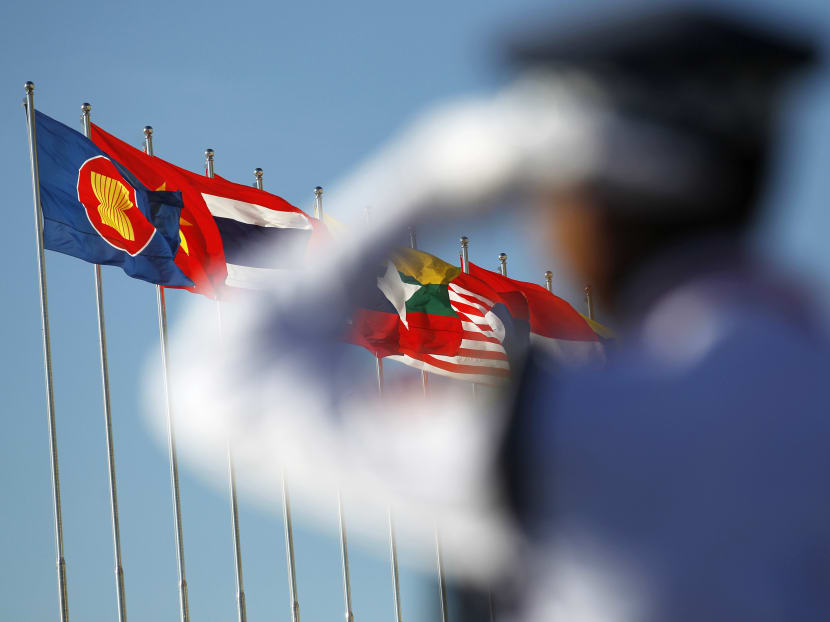Singaporeans least positive about Asean compared to regional counterparts, survey shows
SINGAPORE — Among South-east Asian citizens, Singaporeans are the least positive in their opinion of the Association of South-east Asian Nations (Asean), a survey on regional perceptions has revealed.

A police officer stands near national flags of Asean counties flags during the 25th ASEAN Summit in Myanmar International Convention Centre in Naypyitaw on November 12, 2014. Photo: Reuters
SINGAPORE — Among South-east Asian citizens, Singaporeans are the least positive in their opinion of the Association of South-east Asian Nations (Asean), a survey on regional perceptions has revealed.
The inaugural survey of 3,040 citizens across ten Asean member states by Singapore-based independent research consultancy Blackbox Research found that people from Laos and Indonesia are most positive about Asean, coming in at 88 per cent and 86 per cent respectively.
In contrast, Singaporeans — at 59 per cent — are the least positive.
Singaporeans also ranked lowest in terms of how they evaluate Asean’s achievements in the last 50 years, with only 26 per cent of the Republic’s citizens feeling that the grouping has achieved “major successes”.
The second lowest country with the same sentiment is Cambodia (27 per cent), followed by Thailand (32 per cent).
Indonesia’s and Myanmar’s citizens top the survey question — at 65 per cent each — as those most likely to view Asean as a major success.
“Singaporeans are less enthusiastic about Asean because they feel they have less invested in it,” said Blackbox owner and managing director David Black.
“Singapore has enjoyed tremendous success in the last 50 years while Asean has a patchy track record of achievement. As such, Singaporeans look at Asean through a different lens,” he posited.
The survey was conducted in October, to coincide with the grouping’s 50th anniversary this year. Singapore takes over the rotating Asean chairmanship in January.
Preliminary highlights of the study has been shared with TODAY. The full findings of the survey will be published next month.
Mr Black also noted that Singaporeans, who have built a successful economy over a period corresponding with Asean’s development, see the grouping as something in the background. Asean is therefore viewed as being less critical to Singaporeans’ wellbeing, he said.
More broadly, he said the findings reflect at least two important things — as a brand, Asean has a lot of work to do to make itself seem as fit for purpose in the years ahead.
“Second, Asean needs to look beyond trade and transactions and focus on building stronger emotional fabric. South-east Asians find it difficult to articulate what they have in common,” he added.
Dr Tang Siew Mun, head of the Asean Studies Centre at the Iseas-Yusof Ishak Institute said it is “natural” for Singaporeans to have a lower affinity to Asean.
“Asean has a PR problem in that few Singaporeans know when it is working for them,” he observed.
Although Singaporeans do not see the direct benefits accrued by Asean, this does not mean that the grouping is not important to the city state, he added.
Citing air connectivity as an example, Dr Tang said the Asean Open Skies agreement “literally opens up” travel options for Singaporeans, enabling them to fly to secondary destinations in the region easily and at affordable price.
On Asean’s external relations, the survey also found that Singaporeans place a higher priority to building ties with China, vis-à-vis other respondents.
Twenty nine per cent of respondents from Singapore say Asean should give higher priority to building stronger ties with China, as opposed to an overall response rate of 17 per cent.
Mr Black noted: “Singaporeans feel they have built a successful sanctuary within the region and are more interested in protecting their gains at this point.”
“China is seen as the ‘next big thing’ so it is best to get close. It’s all about pragmatism.”






